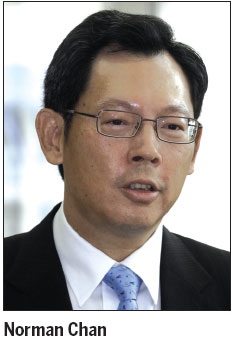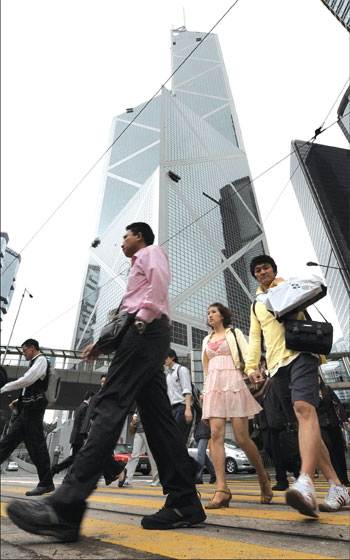Hong Kong to relax restrictions on yuan transfers, HKMA says
Updated: 2010-06-19 06:59
(HK Edition)
|
|||||||||
|
People cross a street against the backdrop of the Bank of China Tower in Central, Hong Kong. The Hong Kong Monetary Authority said Friday it expects to reach an agreement next month with the People's Bank of China, the nation's central bank, on further easing restrictions on yuan-denominated capital transfers between the city and the mainland. Mike Clarke / AFP |
Agreement with PBoC expected next month to move city closer to its goal of becoming an offshore RMB financial center
The Hong Kong Monetary Authority (HKMA), the city's de facto central bank, said it plans to ease restrictions on yuan transfers between banks to encourage financial institutions to develop investment products denominated in the Chinese currency.
The HKMA is in talks with the People's Bank of China (PBoC) and expects to reach an agreement next month to amend existing rules on yuan capital transfers. The response from the PBoC has been "positive," HKMA Chief Executive Norman Chan told a press briefing Friday.
"We hope to soon provide more room and flexibility for the market to develop, but we still have to rely on banks and financial institutions to explore opportunities in yuan business," Chan said.
Hong Kong is trying to capitalize on the mainland's economic growth and increased use of the yuan for trade settlement by promoting use of the currency in the city. Yuan deposits at Hong Kong banks climbed 14 percent in April, the biggest increase in a year, to 80.9 billion yuan.
The city has no laws barring financial institutions from selling yuan-denominated products, the HKMA said in a statement Friday. Some banks in Hong Kong plan to help companies use the yuan to invest directly on the mainland, the HKMA said.
"In the past, you could only transfer capital in Hong Kong dollars or US dollars into China for foreign direct investment projects and then change it into yuan for payments," said Chan. "We will have one more option in the future."

Yuan settlement of trade between Hong Kong and the mainland more than doubled to 7.2 billion yuan in May, compared with around 3 billion yuan in both March and April, the HKMA said.
Settling of transactions using the RMB improved after the HKMA explained settlement rules, said Chan.
The HKMA and the PBoC plan to adjust in July rules on banking to allow people to buy yuan-denominated funds and insurance products, he said.
Beijing approved use of yuan to settle cross-boundary trade with Hong Kong in June 2009, part of a drive to broaden the use of the currency and reduce reliance on the US dollar on fears about continuous depreciation of the dollar.
The State Council approved the expansion of a trial for cross-boundary yuan settlement to 20 provinces, the Xinhua News Agency reported Thursday, citing the PBoC.
The expansion won't pose a threat to Hong Kong, Chan said. Instead, it will boost trade settled in yuan in the city, he said.
Chan said in October, when he began work as the head of the HKMA, that he wanted to consolidate Hong Kong's status as an international finance center and expand the city's role in helping the mainland promote the yuan's use for commerce and investment abroad.
Beijing has effectively pegged the yuan against the US dollar since July 2008 to help exporters weather the global financial crisis. In the previous three years, it strengthened 21 percent against the dollar.
Five institutions, including two international issuers, will sell yuan bonds "very soon," said Peter Pang, deputy chief executive at the HKMA.
Bloomberg News
(HK Edition 06/19/2010 page3)
